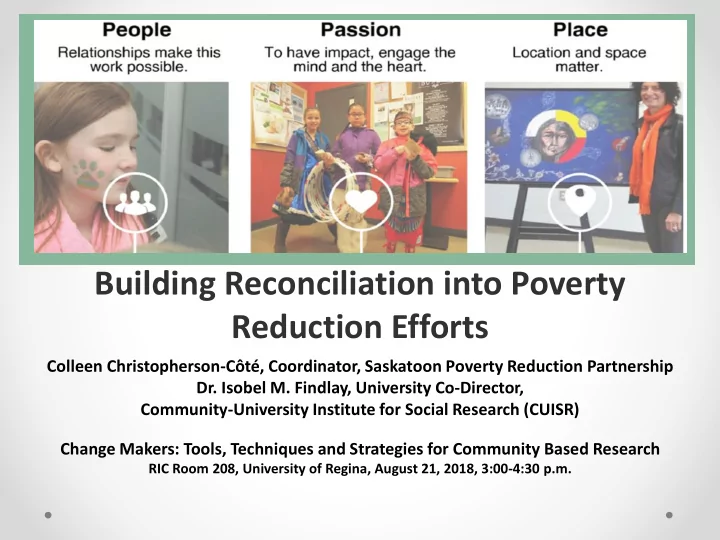

Building Reconciliation into Poverty Reduction Efforts Colleen Christopherson-Côté, Coordinator, Saskatoon Poverty Reduction Partnership Dr. Isobel M. Findlay, University Co-Director, Community-University Institute for Social Research (CUISR) Change Makers: Tools, Techniques and Strategies for Community Based Research RIC Room 208, University of Regina, August 21, 2018, 3:00-4:30 p.m.
Acknowledgements • We gratefully acknowledge the contributions of all study participants. • We are grateful for SSHRC funding as part of the Poverty Reduction research (co-led by Carleton U and Vibrant Communities Canada) associated with Community First: Impacts of Community Engagement (CFICE) • action research aiming “to strengthen community-based non-profits, universities and colleges and funding agencies to build more successful, innovative, prosperous and resilient communities.”
Overview • WHAT: Project to assess the role of community-campus engagement (CCE) or how the University and community work together at Station 20 West Community Enterprise Centre to address poverty and promote social and economic justice • WHY: Costs and benefits of change • WHO: place-based dynamics of research partnership • HOW: our participatory methods • SO WHAT?: Lessons learned about what Community First community-campus engagement (CCE) can accomplish and the colonial residues that can impede .
The Project: o Community-based research project where community partners & university researchers share expertise, work, and learn together to make positive community impact o Detailed review of the complex, intersectoral, and interconnected nature of poverty, the core neighbourhood in Saskatoon, and the impact of community-campus collaborations at Station 20 West Community Enterprise Centre — itself the result of an unprecedented community effort when the provincial government withdrew $8 million of committed funding.
Video: Quint: Saskatoon Communities Shine
The Project Partners
Shared Vision, Methods, & Goals • Long-term formal and informal ties to collaborative, multi- sectoral initiatives to reduce poverty and increase quality of life • Commitment to community economic development approach to social and economic fairness engaging the community in its own development while pooling capacity for collective impact • Investment in community-based research to understand how we can work better together for strong and sustainable communities • Shared definitions and commitment to reconciliation
TRC Calls to Action, UNDRIP, and Treaty • The United Nations Declaration on the Rights of Indigenous Peoples is the framework for reconciliation at all levels and across all sectors of Canadian society. • First Nations, Inuit, and Métis peoples, as the original peoples of this country and as self-determining peoples, have Treaty, constitutional, and human rights that must be recognized and respected. • Reconciliation is a process of healing of relationships that requires public truth sharing, apology, and commemoration that acknowledge and redress past harms. • All Canadians, as Treaty peoples, share responsibility for establishing and maintaining mutually respectful relationships. UNDRIP TRC Calls to Action Treaties (SK)
The Research
Findings • It is a story of people, passion, and place committed to social, economic, cultural, educational, and health equity. Funding withdrawal taught people to be the change. • Co- locators may be diverse but there is “a thread that ties us all together, and that’s social justice”— co-locator. • “a bit of chaos . . . went into the development of S20W” but “it involved expanding the vision of what could be”— co-locator • Social exclusion is at the heart of poverty production; social justice requires “cognitive justice,” respecting multiple knowledges and worldviews. • S20W role in building human, social, and economic capital has driven rethinking about what factors enable economic activity and with what consequences for whom — and revaluing a social economy of safety and of Indigenous traditional practices. • S20W is much more than an enterprise, even “a place of healing,” or “a centre of learning and reconciling.”
“how respectful researchers were in acknowledging that there are many ways of knowing. You don't have to be ‘book smart’ to really have something to offer; you don't have to have had a formal education to be able “I love that there's to tell a story that's research happening. The compelling .”— co-locator quest for digging deeper, asking those difficult questions and that thirst The core community SHINES (credit: QUINT development) for knowledge, why VIDEO people do what they do, how they do — I love that stuff.”— co-locator
YXE Connects 2016 Survey Findings • Station 20 West instilled a sense of security and belonging. • It is a critical source of equity, security, food security, and accessibility. • Many expressed dismay at 2008 government withdrawal of funds and the 2016 closure of Good Food Junction Co-operative — and a return to food insecurity for many. • Recommended expanding services for youth and people with disabilities and promoting S20W more broadly. “ Not much else where you can get everything in one place. It’s especially hard for those of us with disabilities to get around .”— YXE Connects participant “A new building the community supported and paid for.”— YXE Connects participant
Lessons Learned (from the Project)
Lessons Learned (about CCE) • Community expertise needs to be recognized and rewarded equitably. • University CCE expertise needs to be recognized, internally and within community. • CCE is part of the reconciliation story, telling new stories about our shared history and transformative future. • Challenging performance metrics and reward systems can expand what counts in community and university. • CCE is an important site of learning, relationship and capacity building, identity formation, and community (academic, activist, artistic) renewal.
Recommend
More recommend